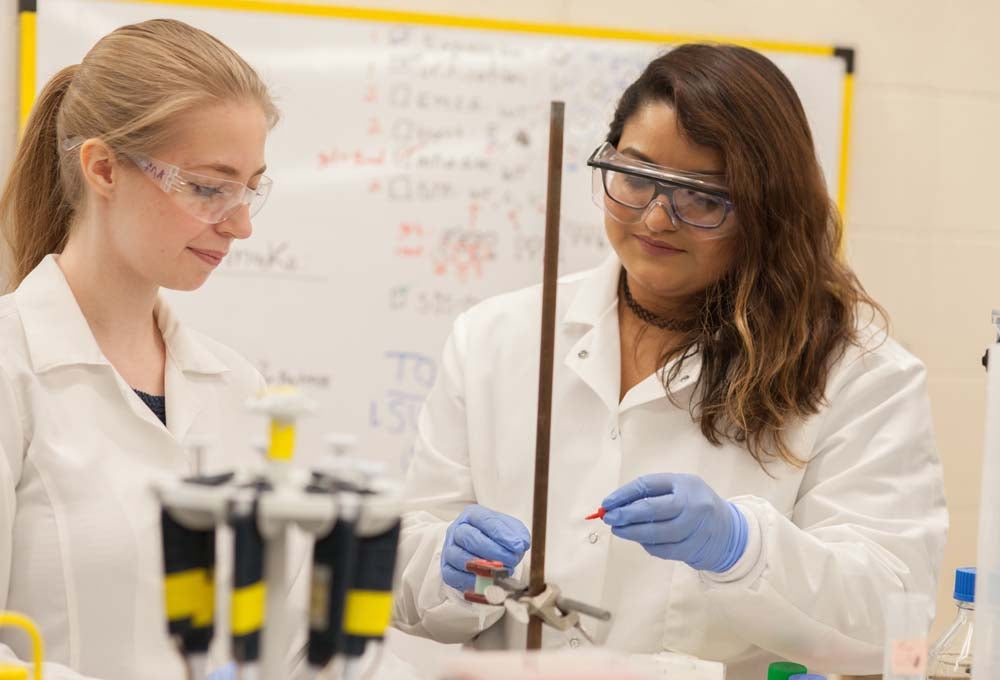 The primary goal of the STAR (formerly SURF) training award is to engage undergraduate students in extensive and supported research experiences during the summer months. The STAR program provides sufficient funding to cover the costs of living and research supplies for up to 3 undergraduate students to perform research for a 10-week period during the summer months. Primarily undergraduate institution (PUI) investigators of all levels who are not current recipients of any other Project Core funding mechanism are eligible to apply to the STAR program. STAR investigators and their undergraduate students are required to present their research findings in the form of a poster presentation at the annual RI Summer Undergraduate Research Symposium (SURS). SURF projects are typically funded for a 2-year period. Calls for proposals will be announced in the fall semester.
The primary goal of the STAR (formerly SURF) training award is to engage undergraduate students in extensive and supported research experiences during the summer months. The STAR program provides sufficient funding to cover the costs of living and research supplies for up to 3 undergraduate students to perform research for a 10-week period during the summer months. Primarily undergraduate institution (PUI) investigators of all levels who are not current recipients of any other Project Core funding mechanism are eligible to apply to the STAR program. STAR investigators and their undergraduate students are required to present their research findings in the form of a poster presentation at the annual RI Summer Undergraduate Research Symposium (SURS). SURF projects are typically funded for a 2-year period. Calls for proposals will be announced in the fall semester.
SURF Training Awards
- Impacts of maternal PFOS exposure on neuronal development - Investigator: Belinda Barbagallo, Salve Regina University Theme: Neuroscience Title: Impacts of maternal PFOS exposure on neuronal development Award: SURF PUI Training Award (2022-2024) Abstract: Neurodevelopmental disorders, including autism, attention-deficit/hyperactivity disorder (ADHD) and learning disabilities, affect approximately 15% of children in the United States, with the prevalence of multiple disorders rising over the last four decades. Most… Continue Reading
- Exploring the Relationship between Structure and Function in KmtR - Investigator: Khadine Higgins, Salve Regina University Theme: Environmental Health Sciences Title: Exploring the Relationship between Structure and Function in KmtR Award: SURF PUI Training Award (2022-2024) Abstract: The long-term goal of this work is aimed at understanding why Mycobaterium tuberculosis (M. tuberculosis) requires two Ni(II)- and Co(II)-responsive metalloregulators associated with the export of Ni(II) and… Continue Reading
- Analyzing the mechanisms of unique adherence phenotypes of super shedder E. coli - Investigator: Matthew Moreau, Salve Regina University Theme: Environmental Health Sciences Title: Analyzing the mechanisms of unique adherence phenotypes of super shedder E. coli Award: SURF PUI Training Award (2022-2024) Abstract: Super shedding (SS) of Shiga-toxin producing Escherichia coli (STEC) from its cattle reservoir is responsible for producing most of the environmental burden of this bacterium.… Continue Reading
- Method and device for electrochemical detection of Thiocyanate ions in saliva - Investigator: Clifford Murphy, Roger Williams University Theme: Cancer Title: Method and device for electrochemical detection of Thiocyanate ions in saliva Award: SURF PUI Training Award (2022-2024) Abstract: This project with adapt an existing invention for the detection of thiocyanate ions in seawater to the analysis of thiocyanate concentrations in human saliva for application as a… Continue Reading
- Genetic analysis of Kita signaling during melanocyte migration - Investigator: Larissa Patterson, Rhode Island College Theme: Cancer Title: Genetic analysis of Kita signaling during melanocyte migration Award: SURF PUI Training Award (2022-2024) Abstract: The KIT receptor tyrosine kinase is required for many aspects of melanocyte behavior including melanogenesis, proliferation, migration, and survival. Mutations resulting in constitutive activation of KIT promote the formation and progression… Continue Reading
- Impact of flagellin methylation on plant immune responses against human pathogens - Investigator: Anne Reid, Salve Regina University Theme: Environmental Health Sciences Title: Impact of flagellin methylation on plant immune responses against human pathogens Award: SURF PUI Training Award (2022-2024) Abstract: Over 1 million cases of salmonellosis occur annually in the US, with outbreaks increasingly linked to fresh fruits and vegetables. Bacterial flagella mediate swimming motility as well… Continue Reading
- Characterizing differences in tissue specific mitochondrial function for neurodegenerative disease - Investigator: Geoff Stilwell, Rhode Island College Theme: Neuroscience Title: Characterizing differences in tissue-specific mitochondrial function for neurodegenerative disease Award: SURF PUI Training Award (2022-2024) Abstract: Mitochondrial function is disrupted at early stages in neurodegenerative disease and this dysregulation contributes to fundamental changes that are part of the disease state in metabolism, innate immune responses, energy… Continue Reading
- Top-down and bottom-up processing in the posterior parietal cortex - Investigator: Victoria Templer, Providence College Theme: Neuroscience Title: Top-down and bottom-up processing in the posterior parietal cortex Award: SURF PUI Training Award (2022-2024) Abstract: The purpose of this project is to determine the functional contribution of the rat posterior parietal cortex (PPC) to specific forms of information processing. The PPC has been generally shown to… Continue Reading
- Metabolic dysregulation in Frontotemporal Dementia - Investigator: Marla Tipping, Providence College Theme: Neuroscience Title: Metabolic dysregulation in Frontotemporal Dementia Award: SURF PUI Training Award (2022-2024) Abstract: A common attribute of neurodegenerative disease is a change in the way cells break down and utilize nutrients, as well as their ability to build new macromolecules. Collectively, this is referred to as metabolic reprogramming,… Continue Reading

